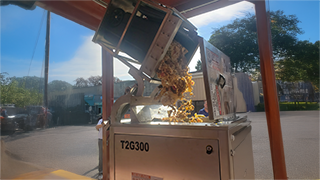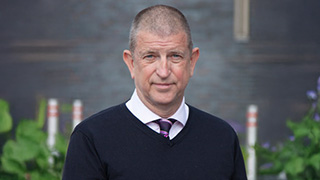Seton Hall’s Arts and Sciences Departments Champion Campus Sustainability
Wednesday, October 22, 2025

The biodigester machine in action. Dumping the food waste into itself to prepare for further processes.
Seton Hall University is taking a major step toward sustainability thanks to a new addition from the Facilities department and a food digester that converts cafeteria waste into compost. The Seton Hall waste reduction initiative is joined by Arts and Sciences faculty Erik Hill, Ph.D., and Nada Khan, Ph.D. The biodigester reflects the university’s growing commitment to environmental responsibility and experiential learning.
Located behind the University Center, the digester operates around the clock, processing hundreds of pounds of cafeteria food waste daily. Cafeteria staff sort and separate the food waste before it is weighed. “The digester can go from 500 pounds of food to just 50 pounds of compost in one night,” explained Erik Hill, Ph.D., assistant professor of Biology and the chair of Seton Hall’s Greenhouse Committee. The system uses heat (45–48°C), oxygen and beneficial microbes to break down food waste into nutrient-rich compost. As the material passes through the machine, it is dehydrated, aerated and transformed into a soil-like grit ready for analysis.
The goal, Hill notes is to reduce landfill waste and prevent methane emissions. Methane is one of the most harmful greenhouse gases and is generated as food decomposes inside a landfill. “This [biodigester] project allows us to see sustainability in action and how something once considered garbage can become a resource for growth,” he said.
From Food Waste to Research Material
Once the compost is produced, biology and chemistry students will collect and test it to evaluate whether it can support plant growth. Khan and Hill, both teach different Core three courses that plan to integrate the biodigester products into class labs, giving students firsthand experience with sustainability science in the classroom. Hill and his students plan to examine microbial diversity before and after digestion, asking questions like:
“Is there a certain bacteria before that we don’t have after? Is there a diversity of enzymes we can document?”
The project will run through different semesters as the compost stabilizes and the students gather consistent data on the compost’s properties.
Building on a Legacy of Green Projects
This initiative builds upon earlier sustainability efforts led by Nada Khan, Ph.D., a member of the Environmental Committee who specializes in Organic and Green Chemistry. Her students previously designed a composting project outside McNulty Hall, where they collected and analyzed three different soil types, which included prayer garden soil, project compost soil and healthy landscape soil, testing them for pH, nitrogen, phosphorus and potassium. Their findings revealed lower nitrogen levels in compost soil, highlighting the need for continued study of something the new digester now enables on a larger scale.
Students Lead the Charge
For student Kenneth Smith, a member of Seton Hall’s Sustainability Club, this project is about more than science it is about community. “Every day, students are directly part of something that makes campus greener,” Smith shared. “We’re learning that sustainability starts with small, consistent actions.”
The digester has been in operation for just one week, but early results are promising. By lunchtime, the machine already reaches its 300-pound daily capacity, showing both the scale of cafeteria waste and the potential for positive change. A Green Future at Seton Hall.
As Seton Hall continues to expand its sustainability initiatives, the food digester represents innovation with real-world impact. Students from all disciplines are encouraged to volunteer and participate in the ongoing compost research. Or as Hill put it with a smile, “There’s a lot of dirt going around!”
For more information, see the Department of Biological Sciences, Erik Hill and Nada Khan.
Click the link to learn more about the specifics of how the digester works.
Categories: Research, Science and Technology






